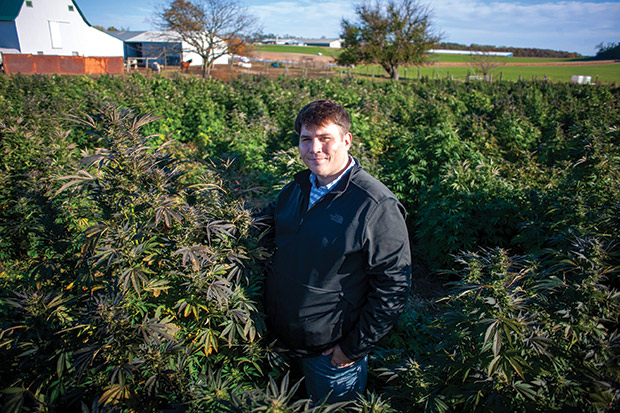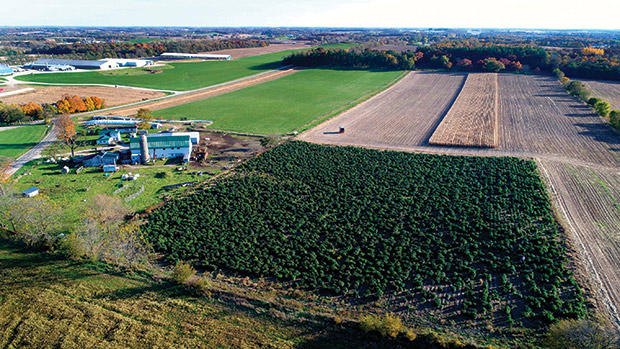SEEING GREEN: Cannabis business law provides profit, cause for lawyers
By: Michaela Paukner, [email protected]//November 26, 2019//
SEEING GREEN: Cannabis business law provides profit, cause for lawyers
By: Michaela Paukner, [email protected]//November 26, 2019//

It’s been a hard autumn for Jonathan Baker, the owner of TFP Sciences.
Baker and his partners recently spent long, frantic days trying to harvest the 27 acres of hemp they planted in Dane and Jefferson counties this year. Their goal was to have their crop hanging up before the first snow of the season, which came in late October.
They were among the 900 registered growers of hemp in Wisconsin this year. Of their collective crop, most was used for the extraction of cannabidiol, known as CBD. The chemical is marketed as a supplement promising the health benefits of marijuana without the psychoactive effects of THC.
Wisconsin’s CBD market has already become appealing to farmers because of its proven ability to be profitable. Yet, despite its legalized status, those who enter the business are still likely find themselves struggling with complications that can only be sorted out by a lawyer.
Hemp, for one, remains subject to various federal and state regulations setting specific limits on THC levels. If a product is found to have levels exceeding the U.S. Department of Agriculture’s standards, federal law requires that it be destroyed, a step that can leave farmers with big losses.
As the regulations surrounding hemp continue to change and Wisconsin grapples with marijuana legalization, many businesses are looking to lawyers for guidance on the up-and-coming industry.
Much like farmers who are trying to get into the hemp industry, lawyers who take up cannabis law are likely to encounter not only the profits but also plenty of obstacles and the need for hard work.
Practicing cannabis law
Around the same time Baker and his partners at TFP Sciences were rushing to rescue their hemp from Wisconsin’s erratic weather, Guy DuBeau was making his way through a record-breaking Halloween snowstorm on his drive to Axley Brynelson’s Madison office. DuBeau is a partner there and founder of the firm’s cannabis and hemp-law team.
DuBeau said the team is the product of a blog post on the firm’s website. After seeing that his writings on CBD legislation were among the firm’s most-read articles, DuBeau talked to several partners about assembling a group of specialists. One of the firm’s goals, he said, is to be always at the forefront of change.
“That’s always been one of the ethics of this firm — to try to see what sort of industries are going to be important in the future and help guide them in an ethical way,” DuBeau said.
The lawyers on Axley’s cannabis team have specialties ranging from corporate and health-care law to real estate and banking. Lawyers in states with well-established cannabis industries say having such a broad range of expertise is indispensable.
“If you want to get into this industry, you first have to be comfortable with your underlying area of competence,” said Chris Davis, executive director of the International Cannabis Bar Association.
“The consequences are too high for us to relax about compliance or the quality of our legal work.”

Keeping up with changes
Even in states where cannabis is legal for recreational purposes, compliance demands a huge time commitment from lawyers. Nabil Rodriguez, an associate at Greenspoon Marder’s Denver office, estimates that he spends at least half of his work day monitoring perpetually changing regulations.
He joined the firm’s cannabis law practice group about a year ago after completing an internship under Rachel Gillette, chair of the group and a litigator with more than a decade of experience in cannabis law. Both Rodriguez and Gillette said they have to strive constantly to keep up with the ever-changing industry.
“It’s a dynamic area of practice,” said Gillette. “On a daily basis, laws are changing.”
Colorado legalized marijuana for recreational purposes in 2012. Since then, 10 states and Washington, D.C. have followed suit. And the use of marijuana strictly for medical purposes has been legalized by 20 states. The continuous change and lack of consistency across the country can put lawyers in a precarious position.
“If you find yourself stepping outside state law on accident or on purpose, and you attract the ire of the federal government, you’re looking at substantial consequences,” Davis said.
Although hemp is legal under a federal law passed in 2014, DuBeau said he’s dealing with many of the same regulatory questions in Wisconsin.
“We’re dealing with an industry where the laws are absolutely in flux and can change with the drop of a hat,” DuBeau said. “Unlike a lot of other areas of the law, it’s difficult to provide certainty to people, and I think that’s going to be the case for awhile.”
Ready for regulation
As Wisconsin’s neighboring states turn green — both Michigan and Illinois legalized recreational marijuana recently — Davis said Wisconsin should being preparing for the likelihood of eventual legalization.
“One of the things about coming last in a regulatory system is you get to learn from other people’s mistakes,” Davis said. “It really behooves attorneys who are going to be engaged in this highly regulated industry to examine what’s worked and hasn’t worked in other jurisdictions for the regulations that will serve their clients, the market and the public interest the best.”
Davis said regulating the cannabis and hemp industries benefits the public. Griffin Lynch, an owner of Wisconsin Hemp Scientific in Sussex, agrees. His business both produces its own CBD oil and measures the concentration of the chemical in growers’ hemp.
“As the industry progresses and becomes more established, all the serious players would like to see more regulation,” Lynch said. “Right now, you can basically sell whatever you want. No one’s really checking.”
Shedding the stigma
Lynch said regulation would add legitimacy to an industry that’s still considered not quite respectable by many — even by people living states where it has been fully legalized.
“There’s always this criminality that hangs over our practice at all times,” Gillette said. “We believe in what we’re doing. This isn’t just a money-making opportunity for us. This is something that we think is really important and will really benefit society at large.”
Davis said the cannabis bar is trying to dispel prejudices against the industry.
“We feel lawyers have a special role to play in shedding that stigma,” said Davis. “More traditional companies are entering the space, and they’re seeing the level of legal sophistication that’s in the cannabis industry. It changes how they view the industry as a whole. That’s something we’re proud of and that we continue to chip away at.”
Rodriguez agrees.
“I’m an advocate first and an attorney second,” Rodriguez said. “One of my favorite questions to ask any cannabis attorney is if it pigeonholes them. Across the board, the answer is no.”
DuBeau said he expected to hear concerns from Axley clients when the firm announced its cannabis team. So far, though, there has been little resistance.
“There’s societal reasons, and there’s good business reasons,” said DuBeau. “It’s a serious industry, and we’re trying to take it seriously.”
The Janesville Gazette’s Neil Johnson also contributed to this report.
Legal News
- Some State Bar diversity participants walk away from program
- Wisconsin court issues arrest warrant ‘in error’ for Minocqua Brewing owner
- Iranian nationals charged cyber campaign targeting U.S. Companies
- Facing mostly white juries, are Milwaukee County defendants of color truly judged by their peers?
- Milwaukee Mayor speaks in D.C. Tuesday at White House water summit
- Chicago man sentenced to prison after being caught with ‘Trump Gun’
- FTC bans non-competes
- Gov. Evers seeks applicants for Dane County Circuit Court
- Milwaukee man charged in dismemberment death pleads not guilty
- Democratic-led states lead ban on the book ban
- UW Madison Professor: America’s child care crisis is holding back moms without college degrees
- History made in Trump New York trial opening statements
WLJ People
- Power 30 Personal Injury Attorneys – Russell Nicolet
- Power 30 Personal Injury Attorneys – Benjamin Nicolet
- Power 30 Personal Injury Attorneys – Dustin T. Woehl
- Power 30 Personal Injury Attorneys – Katherine Metzger
- Power 30 Personal Injury Attorneys – Joseph Ryan
- Power 30 Personal Injury Attorneys – James M. Ryan
- Power 30 Personal Injury Attorneys – Dana Wachs
- Power 30 Personal Injury Attorneys – Mark L. Thomsen
- Power 30 Personal Injury Attorneys – Matthew Lein
- Power 30 Personal Injury Attorneys – Jeffrey A. Pitman
- Power 30 Personal Injury Attorneys – William Pemberton
- Power 30 Personal Injury Attorneys – Howard S. Sicula











